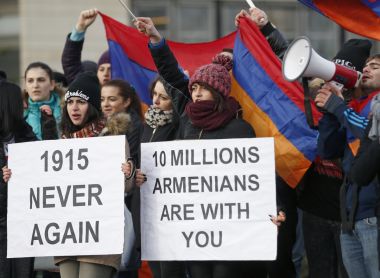Armenian killings were genocide, says World Evangelical Alliance – and Turkey should admit it

Turkey must open its archives to historians so that the Armenian genocide and the mass killings of 600,000 other Christians can be properly acknowledged, the secretary general of the World Evangelical Alliance has said.
In an open letter to leaders of the ancient oriental Churches, Bishop Efraim Tendero wrote that the world-wide commemoration today of the genocide, in which Ottoman Turks killed up to 1.5 million Armenians, also provided an opportunity to remember the parallel ethnic cleansings and killings of 300,000 Pontic Greeks and 300,000 Aramaic-speaking Christians. The killings lasted for nearly 10 years.
Bishop Tendero said: "We welcome the fact that international researchers have investigated the Armenian genocide in depth. We call on Turkey to now open its archives from the period of the First World War, as well as from the Turkish trials of the main participants in the genocide, for historians from around the world."
He also referred to the present situation of Christians in the Middle East, saying: "Even as we mourn the persecution of many non-Christian minorities in Iraq, Syria, and in neighbouring countries, and even as we weep over the many atrocities in the shadow of civil war, we especially suffer with the leadership and the members of the Old Oriental and Eastern Churches throughout the Middle East. We know you are now experiencing a new edition of genocide; this is especially true of the Syro-Arameans.
"Ideologically, the horrors of the Middle East which are taking place before our eyes, are a repetition of the genocides 100 years ago."
The WEA also released a rebuttal of the Turkish government's position on the Armenian genocide. While Turkey admits that many Armenians died, it says that there were casualties on both sides and that there was never a plan to exterminate large numbers of them. The Turkish government has reacted furiously to characterisations of the massacres as genocide, most recently by Pope Francis. It is also a wider focus of discontent for nationalists: when Turkey's most internationally famous novelist, Orhan Pamuk, spoke of the genocide in 2005, rallies were held to burn his books and he was forced to flee the country.
However, a paper by the director of the WEA's International Institute for Religious Freedom, Prof Thomas Schirrmacher, comprehensively refutes the Turkish position. It adds that Turkey "continues to practise severe discrimination against Syrian and Armenian Christians" and says that the European Union is correct to require progress on the ending of discrimination against Christians and the recognition of genocide before Turkey can join the EU.
The Armenian genocide is observed today because it began with the rounding up of 250 Armenian intellectuals in Constantinople. They were subsequently executed. Mass killings of male Armenians followed, while women, children and elderly people were sent on death marches during which they were subjected to robbery, rape and starvation.
While the genocide has been widely studied, the murders of Greek and Aramaic-speaking Christians has received less attention.











